Until a few years ago, it was a matter of course to travel by plane for longer and intercontinental distances. But at least since the Fridays for Future movement appeared and awareness of our personal responsibility for the climate and our environment – especially our CO2 footprint – has increased, people in academics have begun rethinking business trips (Scientists for Future). Is it really necessary to fly to Boston, or could the lecture be held by video link? Could we also get to London by train? And why not combine a hobby with work and cycle to Vienna for the weekend? Some of our own researchers and scholars have begun asking themselves questions like these and have tried out different ways of reducing their impact. In the following, they share their experiences on the road and reveal their motivation to approach business trips in a more climate-friendly way.
Bike Tour to a Conference
Video Clip by Aikaterini Filippidou
The climate scientists Felix Strnad and Jakob Schlör share a common hobby: cycling. For the European Geoscience Union conference last year, the two phD students biked from Regensburg to Vienna. In the video below, they reveal how they fared on their three-day tour and what travel plans they have for the next conference.
Do we really have to go to five meetings a year?
By Philipp Berens
As scientists, we are used to travelling a lot – after all, scientific exchange thrives on personal encounters, on discussion, on engaging with the academic subject and with each other, on getting to know other cultures and, finally, on a glass of wine or two. That’s why I’ve travelled a lot in my career – although perhaps not as much as others, because I already had children while I was doing my doctorate, which means that I have been thinking carefully for a long time about which academic events I really want or need to go to. And that’s really where it begins: Do we really have to go to five meetings a year? And is so much travel good for us?
At some point, other invitations began to come in: an expert commission in the German Bundestag, a lecture in Hamburg, a meeting at the ministry, the evaluation of a research proposal. For a long time, I saw these trips as professional obligations and mentally counted them separately from my private CO2 budget. But the planet doesn’t care about my own justifications, so since 2019 I’ve been trying to avoid flying whenever possible. And because it is always easier to stick to a goal if you make a public statement, I signed Scientists4Future’s “under1000“ pledge, which is a voluntary commitment to refrain from business flights for trips under 1000km.
Since then I’ve tried a number of train trips: travelling to London with the TGV and Eurostar (<8h, expensive, but very comfortable with lunch in Paris and an arrival in the middle of London), taking the NightJet train to Hamburg (3-person compartment, mediocre comfort, but it saved me a day), the NightJet to Berlin (1-person compartment, very comfortable and a nice breakfast), as well as the night ICE from Stuttgart to Berlin (I brought my own pillow and blanket). All of these trips are possible. Indeed, it is even possible to travel from Tübingen to Berlin and back (around 1100km round trip) within 24 hours if your appointment isn’t too long.
Travelling by train is very comfortable on routes that have been appropriately equipped and offer either fast trains or night trains. But cross-border rail transportation in particular often leaves a lot to be desired. And since Covid, a number of attractive connections have not returned; the night train from Hendaye, for example, used to make it possible to get from Tübingen to Lisbon in 24 hours.
For me personally, the under1000 pledge has been both a relief and has slowed my life down to a certain extent. . I try to avoid appointments that I can’t fit within the pledge, and if they can’t be avoided, then I attend by video conference. If the train trip becomes an obstacle due to travel time and I can’t otherwise fit the appointment into my schedule, then my calendar may be too full anyway. Ideally, I would like to do away with flying altogether – in addition to my climate concerns, I also find flying to be extremely exhausting. But its not always possible. In the last few years, for instance, we have started cooperating with the African Institute of Mathematical Sciences. Establishing such partnerships and collaborations requires personal encounters, discussions and getting to know other cultures. And this brings us back to the reason that we as scientists travel in the first place.
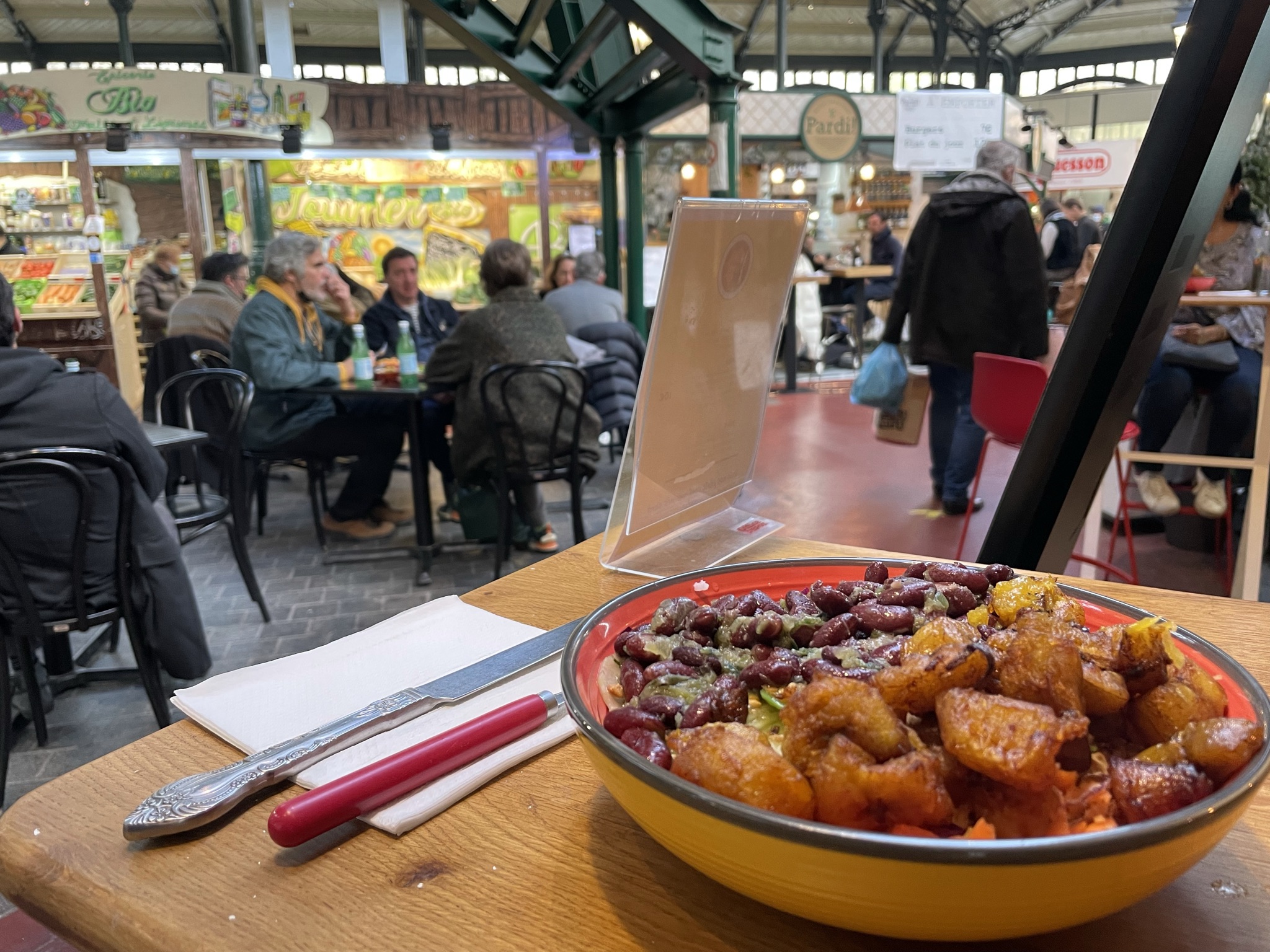
Lunch at the Marche Couvert, Saint-Quentin. © PHILIPP BERENS
To Freiburg by Bike
By Alexandra Gessner
When I signed up for the AutoML Fall School in Freiburg, the idea to get there by bicycle came quite naturally. I’m an avid cyclist, happy for any excuse to use the bike as a mode of transport. It wouldn’t be my first conference travel involving a bike, nor the first time to cycle across the Black Forest from Tübingen. Unlike in a previous trip to a workshop in Dagstuhl, poor public transport infrastructure did not add to my motivation to bike to Freiburg.
Without looking too closely at the map, I contacted friends in Haguenau, France, to split the trip into two days and combine it with a visit. As it turns out, Haguenau is farther from Freiburg than I thought, and I had just added about 100km to the overall journey!
Saturday started with lovely weather, except for a persistent wind straight from the West. Having just recovered from a cold, I chose to avoid the long and steep climbs on the direct route from Tübingen and took a train to Pforzheim instead of crossing the Black Forest on its northern edge. After about 80km in the saddle and a ferry crossing into France, I reached Haguenau. What remained for the following day was a 110km ride in the Rhine Valley. I optimistically started around 15:00 hrs on Sunday, hoping I would reach Freiburg by nightfall, which unsurprisingly did not work out! Strasbourg traffic slowed me down, but I made good progress along the perfectly straight Rhône-Rhine Canal, and then crossed the Rhine back into Germany under the late afternoon sun. Yet I still had to go considerably further south, past the Europapark Rust and the vineyards of Kaiserstuhl. Eventually, dusk set in, but it never got too dark, as the full moon and Jupiter were rising side by side over the Black Forest as I was approaching Freiburg. Having the bike in Freiburg was of great advantage during the entire fall school, as it is the city’s preferred means of transport.
Why opt for a bike? Any practical benefits of travelling to a conference by bicycle would be contrived. It probably takes much more time than public transport, creates some logistic overhead regarding luggage, is clearly more exhausting, and relies on good weather (unless you’re extremely hardcore). It even won’t offset your annual carbon budget when done on just an occasional basis. Yet there are good reasons in favour of the bike; long-distance cycling has the power to alter your perception of time, space, and your physical capabilities. The satisfaction from covering a considerable distance by means of your own muscular strength is immense. Cycling allows you to escape from the complexity of everyday life and reduces your existence to just being yourself, to your bike, and to your path through stunning landscapes that you might have barely noticed from a motorized vehicle.
Although travelling by bike is not a truly viable alternative for business travel, its symbolic value may help raise awareness about the enormous carbon footprint caused by intercontinental conference travel. As scientists who unanimously agree on the causes and effects of climate change, we may want to advocate for smaller, local scientific gatherings, instead of planning insanely huge global conferences in the most remote places on the planet. And cycle to those.
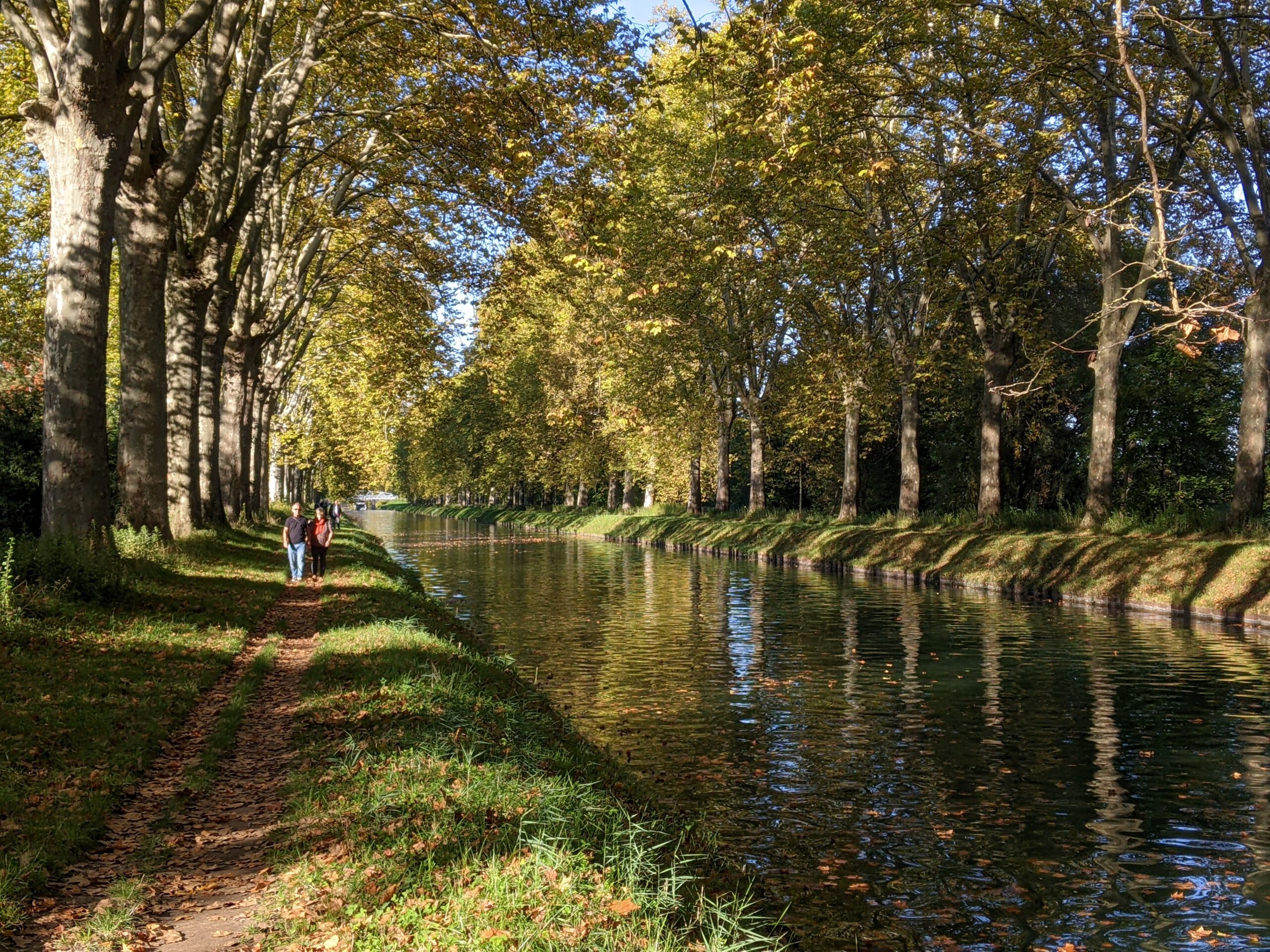
The Rhine-Rhône canal in the autumn sun. © ALEXANDRA GESSNER
Cycling to Zürich with a hand-drawn map
By Christian Baumgartner
While my centre of life has been the lovely city of Tübingen for the past 2 years, originally, I am from Zürich in Switzerland. When visiting friends or family we naturally want to maximise time with them and minimise time on the road, so we always take the fastest route possible. When I heard that one of the main conferences in our research field would take place in Zürich, inspired by my colleagues Jakob Schlör and Felix Strnad who biked to Vienna for a conference, I decided to try it, too. Cycling to Zürich, I thought, would be a fun way to get to know the stuff in between the two geographical cornerstones of my life.
Google maps projected the trip to be around 180 kilometres. I am not one of those people who go on week-long cycling holidays, or even work out regularly. My longest bike trip until then was 80km and that lay quite some time in the past. These days, I only cycle to work on my e-bike, which hardly counts. It was clear from the onset that this would be an ambitious project for me. But probably (hopefully?) doable. In the weeks leading up to the trip, another complication arose when my smartphone slipped out of my pocket and broke beyond repair. Without a phone that I could use for directions, I planned to follow the Neckar to its source to avoid navigation difficulties as much as possible. In addition, I made a hand-drawn map with all of the roads, villages and landmarks to help me find the way for the remaining stretch.
I left Tübingen on a crisp, beautiful Sunday morning in July. My aim was to do the distance in one (very long) day, but I knew that I may not make it, so I packed a tent and camping gear just in case. I also brought loads of power bars, isotonic drinks and a bunch of my kids’ “Quetschies” for the road. The first couple of kilometres were fantastic. It was quiet, I was the only person up and about, and I was making good headway. The first hiccups started happening around Sulz am Neckar. It turns out that the “Neckarradweg” doesn’t actually closely follow the Neckar at all! I got lost a bunch of times, had to ask people for directions, but all in all no big deal. The other thing I haven’t fully accounted for were the vertical metres. I naively assumed following the Neckarradweg would be relatively flat. It turns out there are far more hills than I expected, and I was starting to feel the weight of the camping gear. On the slopes up to Rottweil I was dreaming of my e-bike safely back at home in the bikeshed, while the heat started to ramp up towards 35 degrees and the sweat was running down my face.
After reaching the source of the Neckar in Schwenninger Moos navigation got really hard. I kept getting lost, and in addition my knees gradually started to hurt. After 11 hours on the road and 1000 vertical metres under my belt, I arrived in the town of Blumberg close to the Swiss border. Making it to Zürich was out of the question. But, It was only 30 more kilometres to the camping site in Schaffhausen which I had scoped out. Unfortunately, also another 500 vertical metres. Summoning my last shreds of determination, I hauled myself up the winding pass and then coasted down to Switzerland.
After a relaxing night on a beautiful campsite right next to the Rhine, I attacked the last 50km to Zürich. Arriving at beautiful lake Zürich in the middle of commuters and tourist groups was a surreal feeling. As a result of the indirect route along the Neckar and all the detours in the end the trip amounted to 230km. For me this trip was definitely at the limit. However, it is also immensely satisfying having completed it with my own strength. Now every time we take the fast route to visit friends and family in Zürich, I look out of the window and think about all those little memories along the way.
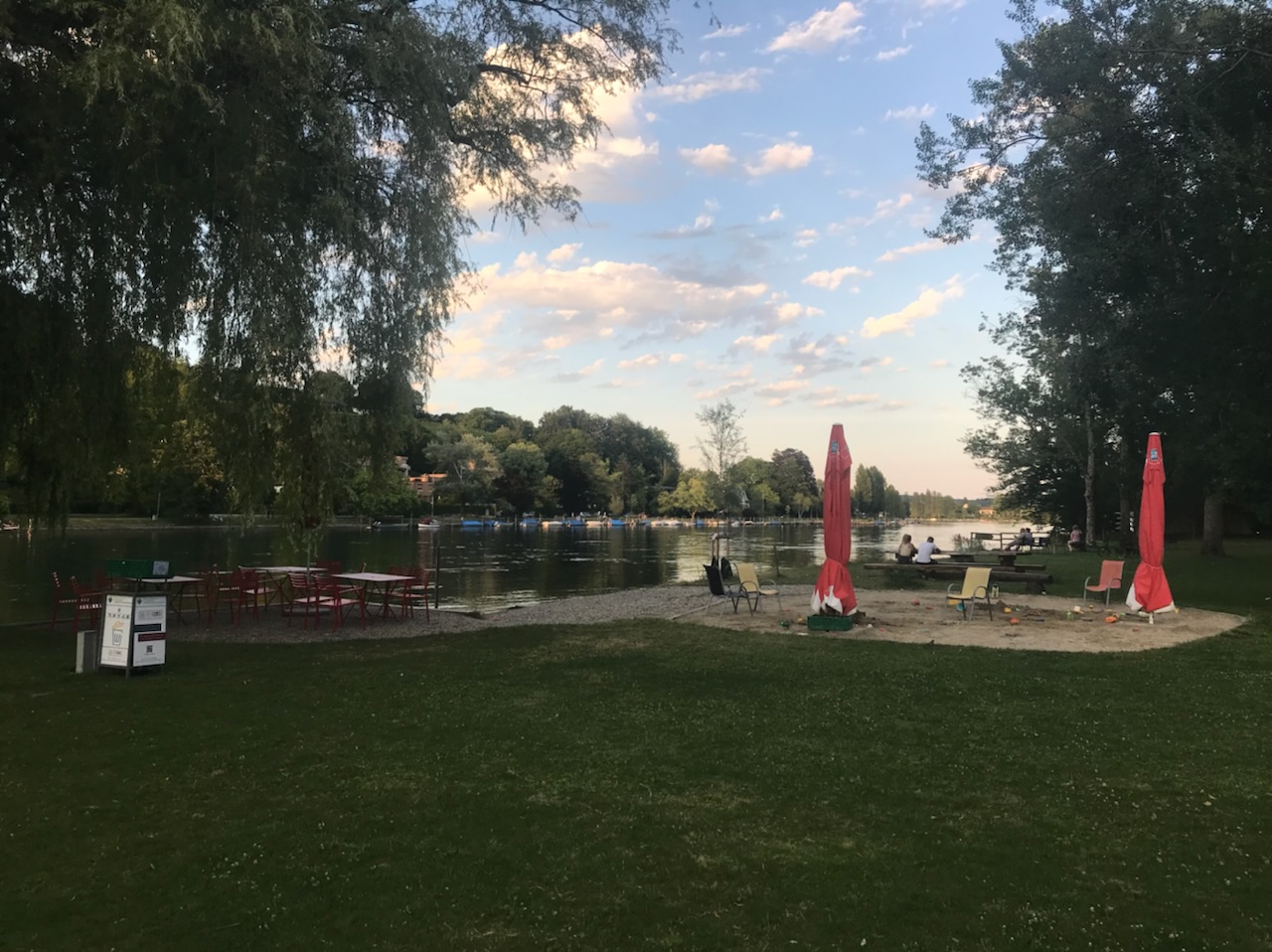
Camping Site at Schaffhausen in Switzerland at the Rhine. © CHRISTIAN BAUMGARTNER
Navigating a New World — As travel restarts post-covid, academics explore new ways to get around
By Philipp Hennig
Sometimes, the thing you need to do happens to be the thing you wanted to do all along. As I have adapted my travel habits to reduce its CO2 footprint, I discovered that these changes had a positive effect on my professional lifestyle. Travelling less reduces stress, and makes those few trips you do much more enjoyable.
Pre-covid, it was widely accepted that academics just have to travel a lot. If you are in the business of selling your own ideas to the world, you have to go around and tell the story. The most extreme case for me — and I am not proud of it — is that I once flew to Boston from Germany to give a 45-minute talk at MIT. Today, this would simply be a video call. One of the great marginal privileges of tenure is the ability to decide whether we need (and want) to travel. The one-two-three punch of pandemic, sustainability, and now increased energy costs also affecting travel, have forced everyone to reconsider how much they really have to be on the road. Staying at home also has its perks: We get to spend more time with our families and students. It has also forced the organizers of meetings, talks and conferences to re-think how and why they want people to attend. Even the largest Computer Science conferences have adapted their program to be more intimate and personal. More poster sessions, less keynotes.
And when you travel less, you can spend more per trip. For me, the best part of rail travel is how much more enjoyable it is. Earlier this year, I attended a workshop near Genoa. Flying there would have meant an early morning trip to the airport, security checks, waiting in line… Instead, I left the evening before, and took the Night Train to Milan. A rolling hotel of single cabins with ensuite bathrooms, and an Austrian conductor who passes by at 9pm to turn down your bed. I woke briefly around midnight as we left the Tauern tunnel, saw the lights of the alpine huts high up on the mountain faces, and felt transported into an Agatha Christie novel. I also love traveling through Paris. A lunch at the Canal St. Martin, before hopping onto the Eurostar to London, or a TGV to Bordeaux. How could anyone prefer a cramped airline seat over this?
But of course, it’s not always so rosy. Europe may have one of the best rail networks in the world, but it still leaves a lot to be desired. For example, it is nearly impossible to get to anywhere in Scandinavia from Germany by train, unless you’re willing to travel for two or three days, or use a ferry (which has an abysmal CO2 footprint). The biggest question, however, is how to deal with major conferences overseas: The pandemic has shown beyond any doubt that virtual meetings cannot offer the intense networking, the bustling poster sessions, the competitive exchange of ideas. For PhD students, attending an international academic conference is a defining experience. How do we square this with the fact that even a single transatlantic return trip increases my CO2 footprint by about 50% (yes, I do my best in the other areas)? I don’t know. And I have not yet found a solution.
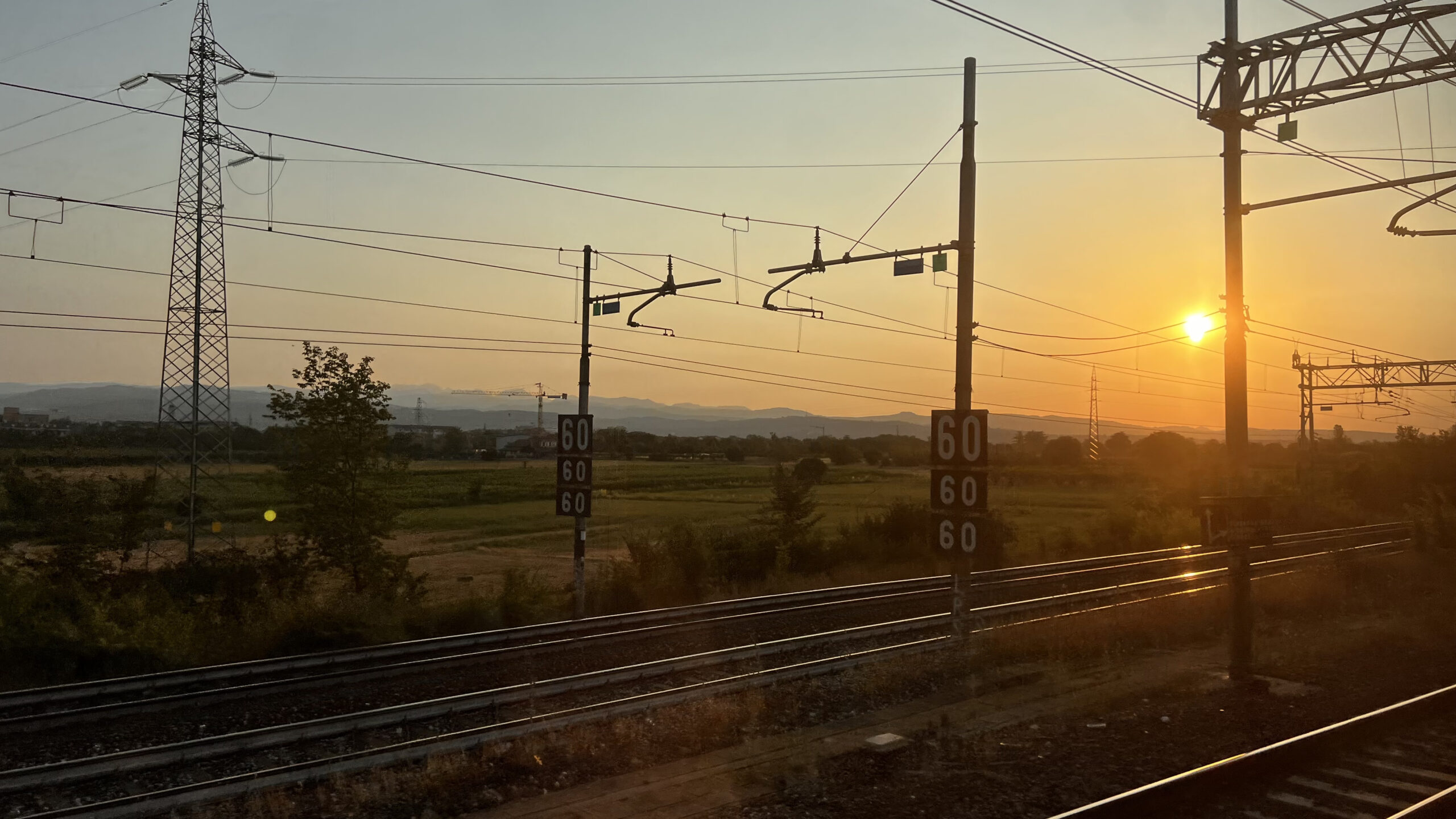
As the sun rises over Lago di Garda, breakfast is served on the Nightjet from Munich to Milano. © PHILIPP HENNIG
And you? Have you already cycled to a conference or avoided flights on longer journeys? Or have these articles inspired you to evaluate your own business trips for climate friendliness? Then feel free to write to us here and share your thoughts or experiences with the community.
Translation to English/German: Fortuna Communication
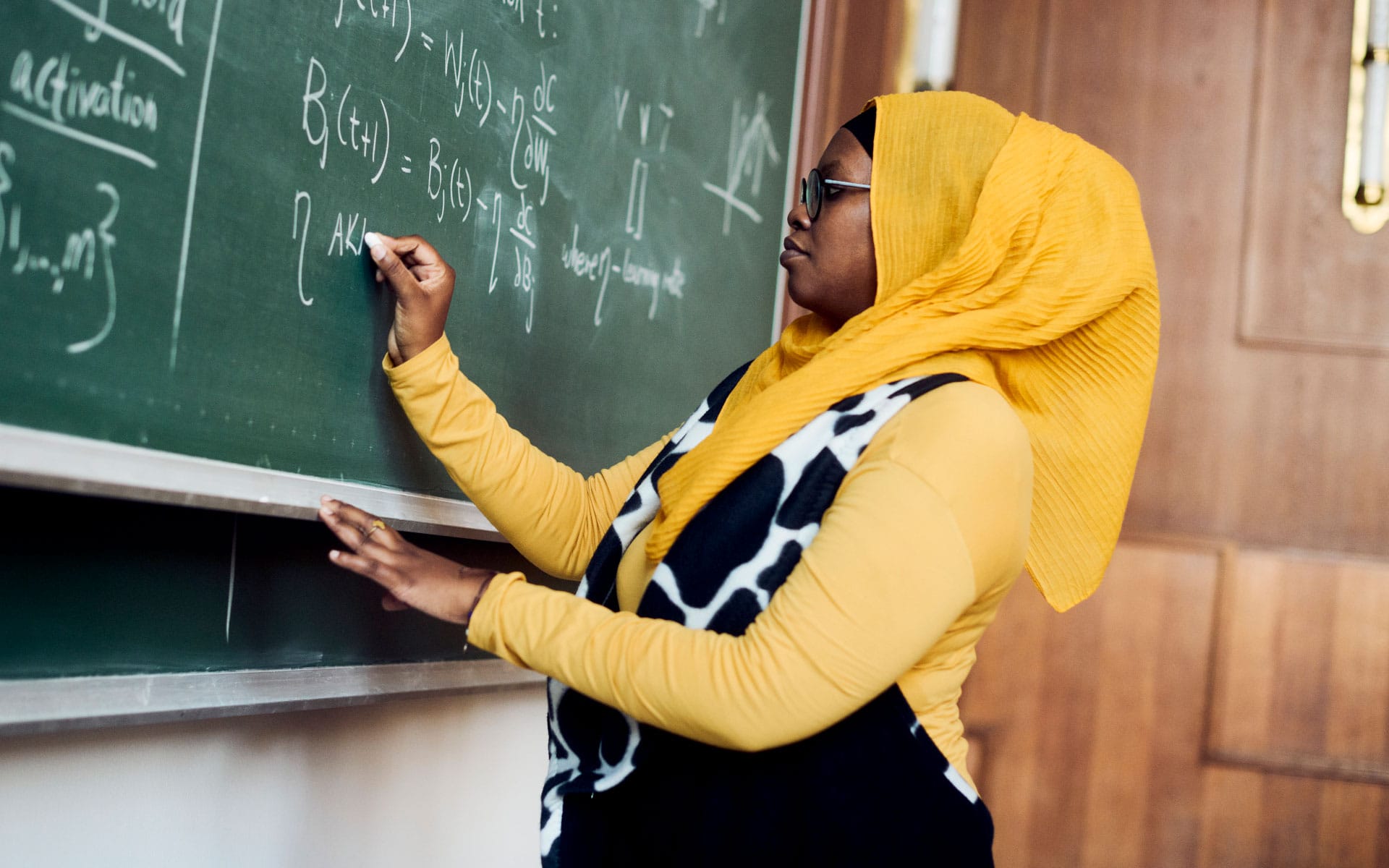
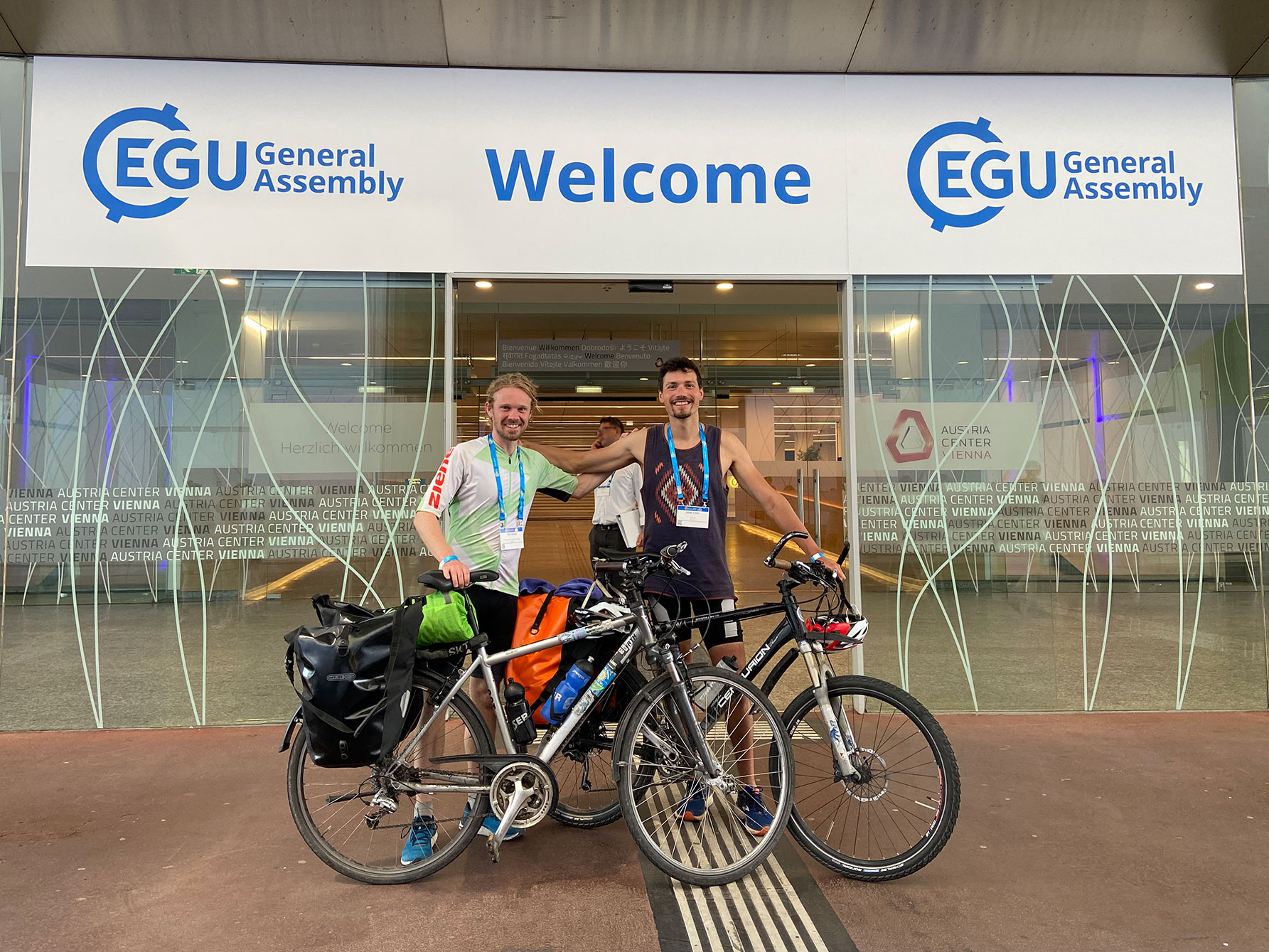
Comments